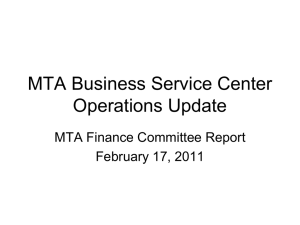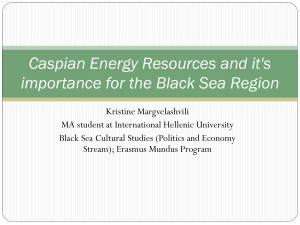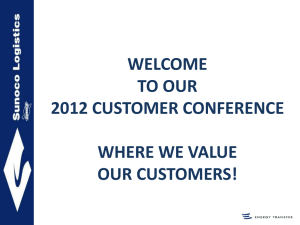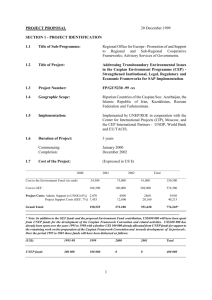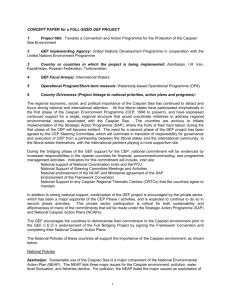transportation – 5 mta
advertisement
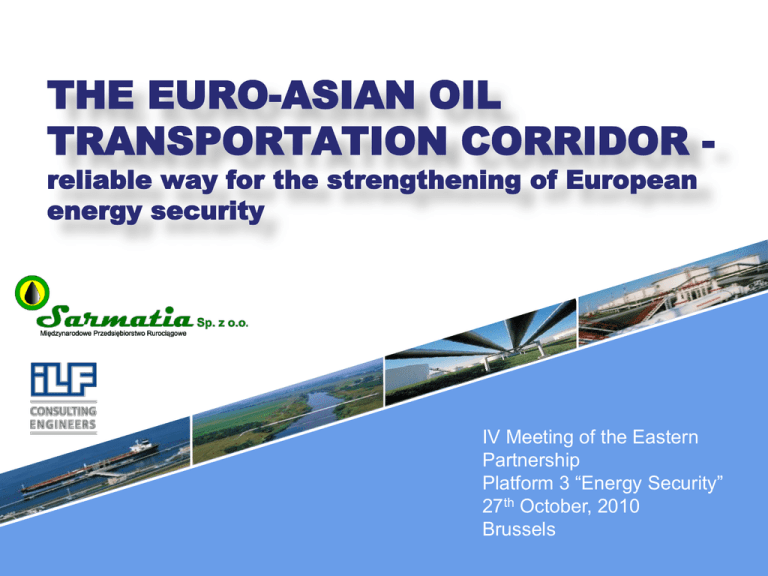
THE EURO-ASIAN OIL TRANSPORTATION CORRIDOR reliable way for the strengthening of European energy security IV Meeting of the Eastern Partnership Platform 3 “Energy Security” 27th October, 2010 Brussels PROJECT OVERVIEW EAOTC Assets will comprise: Lease of existing assets Mazeikiai Contracts with third parties for capacity e.g. longterm arrangements Gdansk Schwedt Plock Ownership/operatorship infrastructure Adamowo of newly Leuna Kralupy Brody Bratislava EAOTC will be characterised by: Odessa Ability to receive and deliver crude oil at a number of receipt and delivery points Transport 5/10/20/30/40MTA of Caspian crude Traverse through participating countries and the Black Sea Batumi, Kulevi, Supsa Baku Flexibility to deliver Azerbaijan, Kazakhstan and other CA crude oil constructed MPR “Sarmatia” Sp z o.o. GOGC EAOTC PROJECT FEASIBILITY STUDY • March 2008 – MPR “Sarmatia” announced the tender for preparation of the EAOTC Project Feasibility Study. • April 14, 2008 – MPR “Sarmatia” in presence of the Presidents of Ukraine and Poland signed with consortium of KBR/Granherne Ltd (UK), Purvin& Gertz (UK), Greengate LLC (USA) the Agreement for the Feasibility Study. • April 24, 2009 – Shareholders of MPR “Sarmatia” approved the Feasibility Study prepared by Granherne consortium. CASPIAN OIL RESERVES & PRODUCTION Current Operations Caspian Crude Oil Reserves (billion barrels) 350 300 Kazakhstan 250 ( 0.3 / 7 ) Uzbekistan ( 0.6 / 2 ) Georgia ( 0.3 / 0.6 ) Azerbaijan (29 / 73) ( 7 / 39 ) Turkmenistan ( 0.6 / 38 ) Volume (MT/yr) ( 30 / 92 ) Russia Potential Expansion 200 150 Current Spare Utilisation 100 Reserves (billion barrels) Proven Source: BP Statistical Review of World Energy 2007 Possible 50 0 Caspian region has significant crude oil reserves Azerbaijan and Kazakhstan will be key exporters Exporting crude oil from the Caspian through EAOTC will providechallenges and opportunities Max. Capacity FUTURE PRODUCTION &TRANSPORTATION • Caspian production has doubled since 2000 Current Systems existing pipeline transportation system capacity ------ upgraded pipeline transportation system capacity • Production is expected to double again by 2020 due to strong increase in Azerbaijan and Kazakhstan • Current oil pipeline systems will reach their ultimate capacity in next five years. New transportation infrastructure will be required then PRINCIPAL FUNCTIONS POTENTIAL EAOTC OPERATING JURISDICTIONS Azerbaijan Georgia Black Sea Operations • • Manage and coordinate activities of operating companies Ensure compliance with applicable environmental standards/laws • Batching • Capacity use management Ukraine Tariff • Establish tariff rates • Service as point of contact with shippers on all matters related to use of system • Manage affairs with host governments EU/Poland Services Implementation • • • Manage development, financing and construction of Project Manage and coordinate expansions and new pipeline sections EU/Lithuania • Firm long-term capacity • Short term – “spot” – capacity • Oil Trader Agreements Sarmatia will be able to act as a “One Stop Shop” in transportation of crude oil from the Caspian to the European market. PROJECT PHASING First Phase Expansion Develop Full Scale Implementation Design 20 / 40 MTA 5 MTA Operate Build EAOTC will have the flexibility to ramp up to a maximum 40 MTA TRANSPORTATION – 5 MTA Mazeikiai Gdansk Schwedt Plock Adamowo Tie-in to Southern Druzbha Leuna Kralupy Brody OBP operating South to North Existing oil tankers on Caspian Sea Bratislava Pivdenny Existing Port Facilities Kazakhstan Oil Fields Existing Port Facilities Rail Transport across Azerbaijan and Georgia <73,000 dwt tankers on Black Sea Batumi, Kulevi, Supsa Baku Azerbaijan Oil Fields TRANSPORTATION – 14,5 MTA Mazeikiai Gdansk Schwedt Leuna Plock Adamowo Tie-in to Northern Druzbha Kralupy Brody Bratislava Odessa Batumi, Kulevi, Supsa Baku TRANSPORTATION – 20/40 MTA Mazeikiai Gdansk Schwedt Leuna Plock New Pipeline Plock - Gdansk Adamowo Tie-in to Northern Druzbha Kralupy Upgraded Pipeline Adamowo - Plock New Pipeline Brody - Adamowo Brody Additional pump and storage capacity on OBP Bratislava Upgraded marine terminal at Pivdenny New port at Kuryk Odessa New marine terminal at Supsa New larger tankers on Caspian Sea New pipeline Sangachal - Supsa Batumi, Kulevi, Supsa New port at Karadag Baku Full Scale Project implementation will optimise existing and new infrastructure GRANHERNE SELECTED TARIFF RESULTS 5 MTA Sarmatia tariffs compare favourably with existing alternative routes for shippers entering system at Baku Sarmatia tariff for 2011 projected to be $1 less than to Kralupy via BTC via Trieste 40 MTA Tariffs structured based on “cost of service” model Structured as function of distance and volume transported and the build out phase IRR projected to be 13-15% over projection period Tax harmonisation and preferential fiscal regime (where possible), as enjoyed by other pipeline systems, will benefit user tariffs and shipper netbacks Plans of Crude Oil Transportation After 2021 More then 30 MTA 2019 20 MTA 2017 10 MTA 2011 - 17 Up to 5 MTA POLAND/EU SUPPORT According to the decision of Poland in July 2009 MPR “Sarmatia” was granted the right to get 495 mln PLN (120 mln EURO) from the funds of the Operational Program Infrastructure and Environment (EAI) for the construction of the Brody – Pock Oil Pipeline. In January 2010, MPR “Sarmatia” signed the Preliminary Agreement with EAI Program coordinator - Institute of Oil and Gas from Krakow on Project preparation. Brody – Plock Oil Pipeline Project March 2010 – MPR “Sarmatia” announced the tender to carry on investigations according to the Preliminary agreement with INiG. July 30, “Sarmatia” 2010 – signed MPR the Agreement with the winner of the tender – ILF Beratende Ingenieure GmbH Procedure of IAE Program Decision of the European Commission on Project financing Application Form for financing Feasibility Study Routing Report Environ. report Public support notyfic. Milestones of Brody – Pock Project Milestone Deadline Submission of 1st edition of the application for Project co-financing 10.12.2010 Completion of the Feasibility Study 10.12.2010 Planned date of obtaining environmental decision 31.10.2011 Submission of final application for Project cofinancing 20.12.2011 Technical Documentation (Detailed Route Engineering) 30.09.2010 Construction Permit 31.03.2013 Finish of the project 31.12.2014 Brody – Plock Pipeline Project Two alternatives routes to be discussed (Base Case EAOTC Study) Throughput: Diameter: Design Pressure: Wall Thickness: 40 MTA 42” 60 barg 11.9mm (acc. to API 5L) Project Brody – Pock Implementation Time Schedule Base case OIL CONSUMERS •Two Ukrainian refineries – Galychyna and Naftohimik Prykarpattya confirmed their interest in receiving up to 5 MTA of the Caspian crude oil through EAOTC • MPR “Sarmatia” carries on negotiations with Polish refineries concerning Caspian oil delivery •In November 2009 SOCAR started the regular delivery of Azeri Light crude oil to the Ukraine. This is another confirmation of the viability of EAOTC. BENEFITS OF THE PROJECT • creates an alternative, independent and reliable transportation route for the crude oil from the Caspian Region to Europe; • offers European customers an ability to deliver up to 40 MTA of high quality Caspian crude oil per year; • allows to increase the level of energy security in the participating countries and EU, improves level of reliability of supply – demand balance for its customers; • provides for integration of Ukrainian oil transportation system with Polish and European ones increasing European Energy Solidarity and improves the economic ties between the EU and countries participating in the Project; • gives an opportunity to develop further cooperation and partnership between EU and oil producing countries of Caspian Region. EXPECTATIONS AND NEXT STEPS • the continuation of strong political support for the EAOTC project from the participating countries and EU institutions; • support within the framework of EU Eastern Partnership Programme; • the timely preparation of the Inter-Governmental and Host Governmental Agreements concerning EAOTC; • negotiations with potential shippers and consumers of crude oil. • financial support from European funds, EBRD, EIB and other international financial institutions. Euro-Asian Oil Transportation Corridor Project can significantly improve the energy security of EU and neighboring countries 68 Nowogrodzka St., 02 – 014 Warsaw, Poland tel. +48 22 5040770, fax +48 22 504 0771 sarmatia@sarmatia.com.pl www.sarmatia.com


